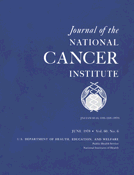-
Views
-
Cite
Cite
Jun Minowada, George Janossy, Melvyn F. Greaves, Teruhiko Tsubota, B. I. Sahai Srivastava, Shigeru Morikawa, Eiji Tatsumi, Expression of an Antigen Associated With Acute Lymphoblastic Leukemia in Human Leukemia-Lymphoma Cell Lines, JNCI: Journal of the National Cancer Institute, Volume 60, Issue 6, June 1978, Pages 1269–1277, https://doi.org/10.1093/jnci/60.6.1269
Close - Share Icon Share
Abstract
Thirty human hematopoietic cell lines were studied for the presence of a cell-surface antigen on the non-T-, non-B-cells of acute lymphoblastic leukemia (ALL), which is a major subclass leukemia of ALL. This cell-surface antigen is referred to as common ALL (cALL). Whereas 9 or 20 proved leukemia-lymphoma cell lines studied were positive for cALL antigen, all 10 normal Epstein-Barr virus-positive, B-lymphoblastoid cell lines were negative. On the basis of cell markers, the nine cALL antigen-positive cell lines could be classified as two non-T-, non-B-cell ALL's, one lymphoid-type blast crisis of chronic myelocytic leukemia, four (of a total of six) T-cell leukemia-lymphomas, and two (of a total of 10) B-cell lymphomas. Cross-absorption studies established the complete antigenic cross-reactivity of the cALL antigen on these various cell lines and fresh cALL antigenpositive leukemia cells. Although ALL's with T-cell phenotype (T-cell ALL's) were previously shown not to express the cALL antigen, we found the leukemias of 7 patients (of 89 patients with leukemias with a T-cell phenotype: positive human thymus leukemia antigen and negative B-cell-associated membrane structures detected by rabbit antisera made against human p24, 31 antigen) that resembled those four T-cell leukemia-lymphoma lines in weakly expressing the cALL antigen. Serial studies on the cell cultures demonstrated stable expression of the cALL antigen. We interpreted these results in terms of a pluripotential stem cell and/or lymphoid precursor cell association of the cALL antigen.
- phenotype
- acute lymphocytic leukemia
- process of absorption
- herpesvirus 4, human
- cell culture techniques
- b-cell lymphomas
- leukemia, myelocytic, chronic
- stem cells
- antigens
- blast phase
- cell lines
- cross reactions
- epstein-barr virus infections
- hematopoietic stem cells
- immune sera
- leukemia
- lymphoma
- tissue membrane
- oryctolagus cuniculus
- t-lymphocytes
- thymus gland
- viruses
- leukemia, precursor b-cell lymphoblastic



